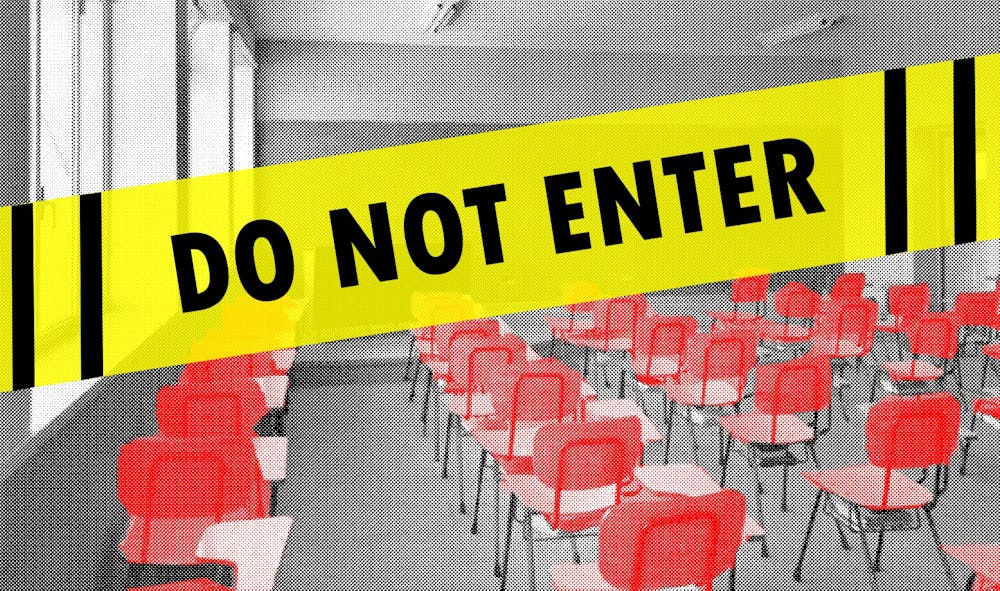Students can take classes asynchronously, accommodations for high-risk students and staff

Illustration by Yifei Zhang
Rice made further announcements concerning fall semester at a faculty town hall on Tuesday, June 23 after initial decisions were announced on Thursday, June 18. Students cannot be required to attend a class synchronously during dual delivery, the Registrar’s Office will soon release updated schedules listing which courses are online-only and a form will soon be sent out asking students and staff if they are at a higher risk of severe illness, according to Christopher Johns-Krull, the chair of the Academic Restart Committee.
According to Johns-Krull, instructors should expect a fluctuation in the number of students attending class in person on each given day, since some students might need to attend class remotely. Rice has been committed to dual-delivery mode since early May when President David Leebron announced that all in-person classes will be recorded and able to be accessed remotely.
“People will need access to the material potentially in an asynchronous way, so I think it will be best to prepare your lectures so they are recorded,” Johns-Krull said. “[This is] so students who miss [a class], many of them for very legitimate reasons, are able to engage with the material.”
Some professors have expressed concerns about students returning to campus. English professor Helena Michie said that in addition to health concerns about humanities faculty members, she worries that students are imagining that on-campus life will resemble previous years.
"The argument, of course, for in-person teaching, however modified, is that it’s more intimate, it’s what the students want. [But] I’m really wondering whether the students have imagined in a really detailed and granular way what those classes are going to be like and what the dorms are going to be like," Michie said. "I'm worried that we [will be] doing all this for something that is not what we want anyway."
Over the summer, students and staff will be asked to disclose in a form whether they fall into one of the categories identified by the Centers for Disease Control and Prevention as having a high risk of severe illness if infected by the coronavirus, according to Provost Reginald DesRoches. A separate form will ask whether students plan to return to campus in the fall, according to Johns-Krull.
“We don’t ask for any medical information. All we ask is that if you’re asking for accommodations, such as being able to teach online or working at home or some kind of special preparation in the workplace, and we’ll do our best to grant those,” Desroches said.
According to Johns-Krull, instructors cannot require their students attend a class synchronously online, as opposed to viewing an asynchronous recording of the lecture, nor require that students attend classes in person.
“We can’t mandate dual delivery synchronously due to the various concerns around health and access for students who are not able to get to the U.S.,” Johns-Krull said. “To require them to attend synchronously at midnight in their local area, the [Academic Restart Committee] is not willing to make that call.”
When students receive their revised schedule over the summer, they will be able to see which courses will be taught only online and which through dual delivery, according to Johns-Krull. If an instructor chooses to teach an in-person segment, students will be aware of the decision before registering for classes, according to Johns-Krull.
According to registrar David Tenney, the Office of the Registrar will soon release updated fall schedules to reflect the changes in class length and location. Tenney stated that students will have the option of changing their schedules throughout the summer.
“It’s not uncommon for continuing Rice students to review, re-evaluate, and make add/drop changes to their fall schedules during a normal summer,” Tenney wrote. “Throughout the summer, it would be good for students to revisit their schedules and fall 2020 plans.
Michie said that although professors may want in-person classes to maintain contact with students, that intimacy will be hard to replicate while following social distancing guidelines.
"Being six feet apart, you can’t work really well in small groups except through some kind of Zoom, which belies the purpose of the [in-person] proceedings," Michie said. "So I’m just worried about how classes will be conducted and about this fantasy of intimacy through plexiglass shields, through social distancing."
More from The Rice Thresher

Worth the wait: Andrew Thomas Huang practices patience
Andrew Thomas Huang says that patience is essential to being an artist. His proof? A film that has spent a decade in production, a career shaped by years in the music industry and a lifelong commitment to exploring queer identity and environmental themes — the kinds of stories, he said, that take time to tell right.

Andrew Thomas Huang puts visuals and identity to song
Houston is welcoming the Grammy-nominated figure behind the music videos of Björk and FKA twigs on June 27.

Live it up this summer with these Houston shows
Staying in Houston this summer and wondering how to make the most of your time? Fortunately, you're in luck, there's no shortage of amazing shows and performances happening around the city. From live music to ballet and everything in between, here are some events coming up this month and next!

Please note All comments are eligible for publication by The Rice Thresher.